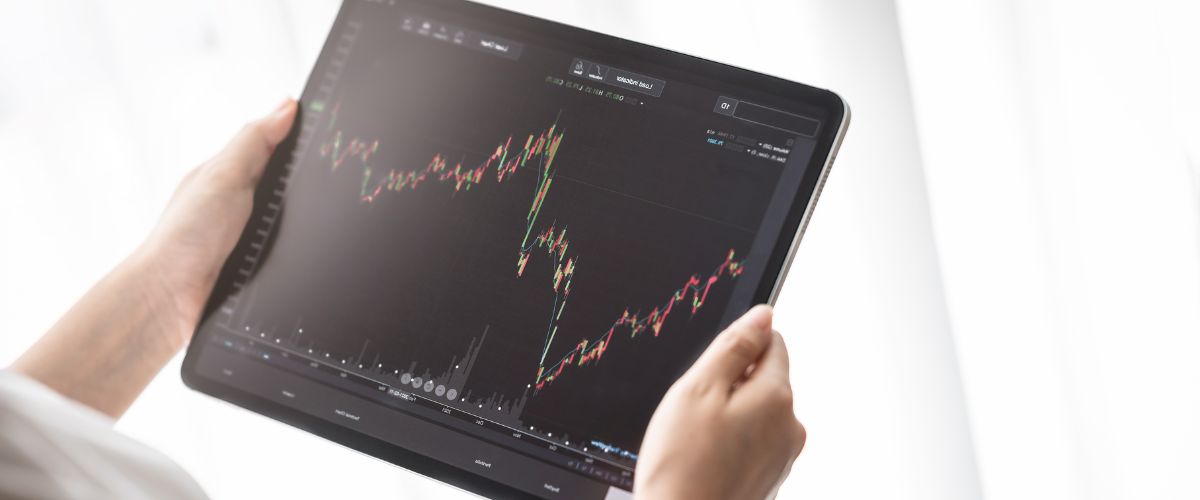Dunned Inventures is reader supported. When you invest through our links, we may earn a small commission at no extra cost to you
Gold is an incredible investment to make because of its inverse correlation with the economy as a whole. Gold is known to perform well when times get tough or uncertain, making it a great asset to balance a portfolio. Once you start choosing the gold to invest in, it can become confusing, especially when comparing physical gold and gold ETFs.
But which option is the best? Though each type has pros and cons, most people prefer (and do better with) gold ETFs. But why?
Gold is an incredible investment to make because of its inverse correlation with the economy as a whole. Gold is known to perform well when times get tough or uncertain, making it a great asset to balance a portfolio. Once you start choosing the gold to invest in, it can become confusing, especially when comparing physical gold and gold ETFs.
But which option is the best? Though each type has pros and cons, most people prefer (and do better with) gold ETFs. But why?
What Is A Gold ETF?
An ETF is an exchange-traded fund, so a gold ETF's only "fund" is gold. Purchasing a gold ETF does not give you any physical gold. Instead, it provides you with contracts backed by gold that hold similar values as physical gold. ETFs operate similarly to stocks, so it's quick, simple, and nearly effortless to trade them.
What Is Physical Gold?
Physical gold is a precious metal that you can keep in a safe, physically trade with other people, and even meltdown for other uses if desired. As you can imagine, owning physical gold is a bit more cumbersome than owning a gold ETF, but some people prefer having access to a tangible object that holds value on its own.
Benefits Of Investing In A Gold ETF
It's Easy to Trade (Liquid Assets)
You can instantly buy or sell gold ETFs with the click of a button. There aren't any physical products to move around, relocate, store, or protect, so it's a fast and instantaneous transaction. Many other people and companies are also willing to trade gold ETFs, adding to the convenience.
Buy as Much or Little as You Want
Gold ETFs allow you to purchase fractional pieces of the ETF. So if you haven't built a large investment portfolio, that's not an issue. You can slowly build your portfolio one fractional purchase at a time. Gold usually requires you to purchase coins or bars only, so you have to have the exact amount of money available to make those investments.
Cannot be Lost or Stolen
Unlike physical gold, losing, destroying, or having these assets stolen from you is impossible. Keeping physical gold puts you at risk in many ways, but having an ETF mitigates all dangers and worries.
Few or No Overhead Costs
Gold is heavy, cumbersome, and expensive to transport. If you want to keep physical gold at your residence, you should keep it in a secure location, like a locking safe. If you don't want the fuss and hassle of keeping it on your property, you'll need to hire someone else to do these jobs.
These administrative tasks are significantly more expensive. You'll need to hire a person or a company to transport, store, secure, and regularly monitor your assets.
A Gold ETF removes these issues, and there are usually few or no overhead operating costs for the ownership of the asset.
Cons Of Investing In A Gold ETF
Gold ETFs May Be Confusing
There are several ETF options on the market, and many gold investors aren't educated on how ETFs work. There is a slight learning curve to this investing method, which can be confusing at times, especially when getting started as a beginner.
You'll need to look to someone you can trust for guidance or do your due diligence to research Gold ETFs to make an educated purchase.
You Don't Own Physical Gold
Owning a gold ETF does not give you ownership of any physical gold. You will miss out on nearly all of the benefits listed below of owning physical gold as an asset.
There Are Fees for Trading ETFs
The ETF trading fees could cut your profit if you like to buy and sell assets regularly. While it is possible to sell gold for its total value to another person with no fees, that is not possible when it comes to gold ETFs (or any other kind of ETF). Day traders should skip ETF investments.
Benefits Of Buying Physical Gold

No Trading Fees
To buy or sell gold, you must find a trader and make the purchase. You will not be charged transactional or trading fees, which can be handy.
Physical Gold Does Well in Uncertain Times
Gold tends to do well when the economy starts to fall, inflation rises, or people worry about the financial future. Gold is known for being a balancing part of the portfolio, designed to rise in value when almost all other assets are performing poorly.
You Choose When You Buy or Sell
You can buy or sell gold whenever you want, so long as you can source a buyer or seller. You do not need to work through a trading platform or a corporation to make gold-related daily trades.
You Can Use It For Other Purposes
Gold is more than an investment vehicle, a piece of currency, or a collector's item. Gold can be used to make art, jewelry, electronics, aerospace technology, dentistry, medical tools and practices, and even as a building material.
Gold is Currency, Especially in Emergencies
If you worry about the power grid or internet communications failing, gold is a fantastic way to protect yourself and give you a type of currency after disaster strikes. It can offer people peace of mind by knowing they have at least one type of investment that will work, even in the worst of times.
Cons Of Buying Physical Gold
You Need to Transport, Store, and Secure It, Or Pay Administrative Fees
Gold is heavy, and it takes up a lot of space. You will need to make a safe and secure space for it on your property somewhere while running the risk of being robbed.
A waterproof and fireproof safe bolted to the floor is a great idea, and so are security cameras. You'll need to physically move this gold to purchase or sell it too. If you only have a few small pieces, your work will be minimal.
However, investing copious amounts in tangible gold assets can become difficult and overwhelming quickly.
If you are not interested in owning physical gold, you will need to pay administrative fees to someone else. These fees are usually sizable and will impact the overall profitability of your physical gold investment.
It May Take a While to Trade
If you can't find another person willing to buy or trade the gold you own, you will be stuck with it until you do. You should consider not having a fast, liquid asset when choosing between physical gold and gold ETFs.
Gold Has Low Returns During Economic Prosperity
When times are good, gold is probably not performing well. This applies to physical gold and gold ETFs, but the effects are usually more apparent in physical gold assets.
Have A Reputable Company Store YOur Gold
How To Invest In A Gold ETF?
Research Gold ETFs, then Choose One
When you are researching gold ETFs, it's wise to look at the following aspects of the ETF:
Buy the Gold ETF
Once you've settled on the ETF (or ETFs) you wish to purchase, you may do so through a broker. If this is your first time having a brokerage account, you'll need to set one up first.
Creating a Brokerage Account for Your Gold ETF

Most modern brokerages allow you to create your account online from your phone or via a phone call. Many do not charge inactivity fees or transaction fees or have minimum account balance policies.
Opening a brokerage account is similar to opening a bank account in many ways, as it will ask mostly the same questions and require similar data from you.
You may have the option of hiring a "Robo-investor" to run your brokerage account. A Robo-investor is not needed but can be a pleasant hands-off approach for those interested.
They offer curated portfolios, build and then manage them, and do a lot of the exhausting legwork for you. Robo-investors require a portion of your account balance to work for you—most charge about 0.25% of your total brokerage account balance.
Purchasing Gold ETFs
Buying Gold ETFs is quite similar to purchasing stocks.
You can trade stocks over the phone, on a website, or even on an app. Look for a "trade" button on your brokerage account (if online), and then follow the on-screen instructions.
Gold ETF trading prices are controlled by the current bids that high-price investors are willing to spend, called Bids. On the other hand, asks is the absolute lowest sellers will take in exchange for the gold ETF.
Choose the number of shares you want to buy. Then choose your order type. There are four common order types.
Best Gold ETF
Perth Mint (AAAU) by PMGOLD
As of November 2022, Perth Mint has a five-year growth of 36.10%, narrowly passing VanEck Merk Gold (OUNZ) at 35.51%.
In the past year, Perth Mint has risen in value by 6.45%. It is currently worth $17.38 with a management fee of 0.15%. The product size is close to $646,000,000.
Where To Buy Physical Gold?
You can purchase physical gold almost anywhere. You can buy it from online retailers, brick-and-mortar shops, commercial gold dealers (online and offline), and even through some brokerages.
If you want to purchase gold that may or may not be in bar or coin form, check out jewelry stores, pawn shops, friends, family, strangers, and more.
Gold ETF vs. Physical Gold: Which Is Better To Buy?
The best option depends on your situation and your goals as an investor. If you want a product that you can hold in your hand, go with physical gold.
If you're looking for an investment that is easily traded, cannot be lost, and cannot be stolen, opt for the gold ETFs.
Summary
There are many reasons someone may feel conflicted about choosing between a tangible piece of gold or a gold ETF investment. It all comes down to your preferences, situation, and long-term goals as an investor. Most people prefer gold ETFs for convenience, though physical gold assets are still a good choice.
About Roy Guller
I have been an investment adviser for more than 30 years and managed more than 500 million dollars for my exclusive group of clients. My expertise lies in retirement funds and I want to share my wealth of experience with you so you can make the right decisions for your future.
You Might Also Like These...
